Winter speckled trout are great because, unlike during summer, they're extremely close to the dock. In some cases you don't even need a boat to get after a good box of speckled trout. They become easily catchable along stretches of LA-1 in Golden Meadow and similar locations. The same goes for slot redfish, to such an extent that one can enjoy a Redfish Jubilee, like Evan did in his 2018 report pictured below.
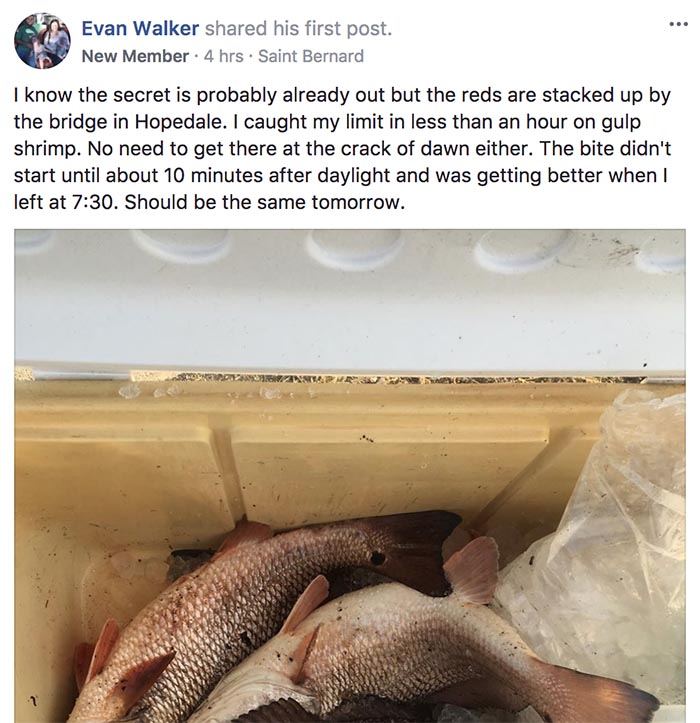
However, this doesn't mean that catching winter speckled trout doesn't come with its challenges. One of those challenges is finding exactly where these fish are biting. While that's a puzzle to solve anytime of the year, what makes this such a challenge is that the best fishing spots tend to be those that fly in the face of conventional inshore fishing knowledge: you must fish where there is moving water.
But not during winter! The best fishing spots for winter speckled trout tend to be those locations that are devoid of current and have some depth to them. "Still deep water" is the term I use to describe these fishing spots.
Why do winter speckled trout seek "still deep water"?
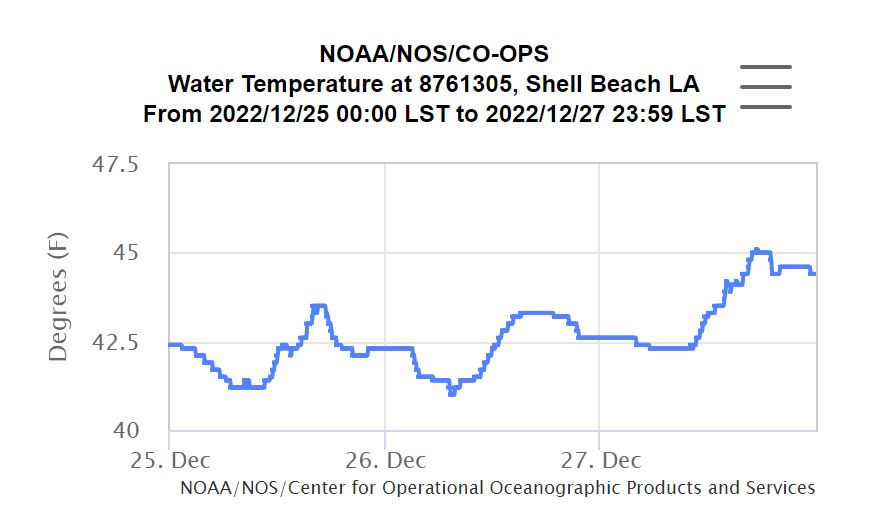
This will send fish running for the relative security of deep water. I describe such behavior in more detail in this guide about why speckled trout seek deep holes. It makes sense that they would do this because speckled trout can hardly swim when it gets really cold.
In fact, when it gets this cold, most fish become too lethargic to escape shallow water and end up becoming exposed and die as northwest winds blow water out of the marsh. It happens, and you can see pics of it in real life in this article. So it makes sense to me the only place they can position themselves to do anything is in water that isn't moving so fast.
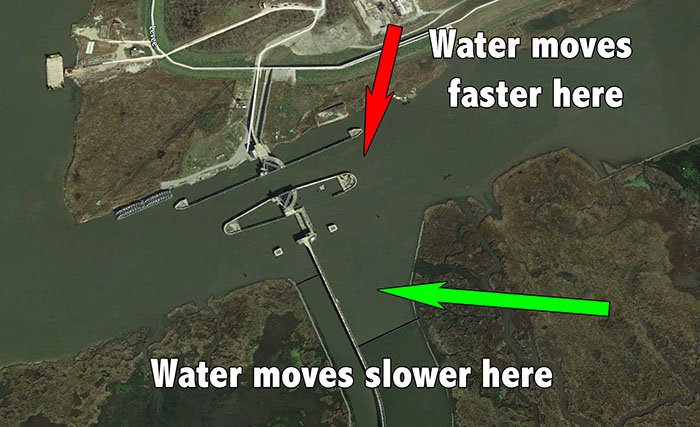
The point isn't to fish this exact spot, but to use this as a model for fishing many that are like it in order to zero in on winter speckled trout.
What does this mean for inshore anglers?
Typically, when we are targeting redfish and speckled trout (especially specks!) we focus on tidelines. Finding tidelines on satellite imagery or recognizing them in real life is an essential skill for inshore anglers, but this time I am thinking I should forget the tidelines and focus on where I do not see them.
Go ahead, boot up Google Earth Desktop and show me the tidelines running through the Wall where the green arrow is pointed. You won't find them. That doesn't mean moving water isn't there, it just means I don't see tidelines there.
You know what's another great area to try for winter speckled trout when it gets silly cold? Lakeshore Estates in Slidell. No tidelines there, either -- though there are plenty outside of there.
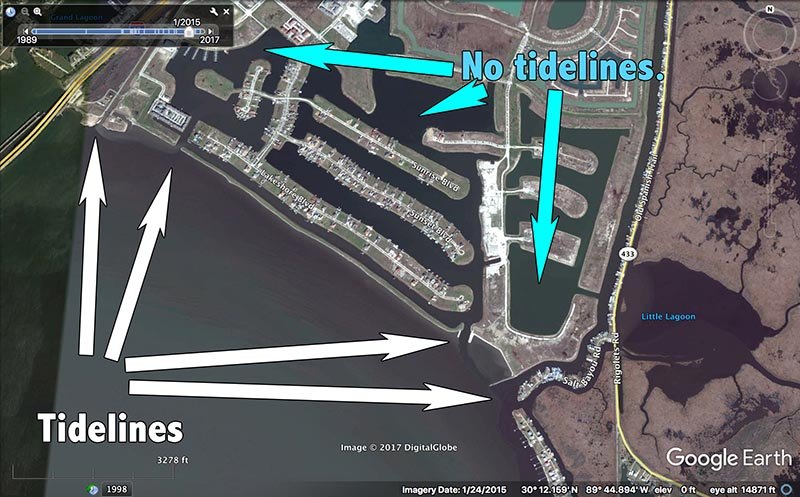
Notice how these spots are sort of like "dead ends" where water moves the least, not unlike dead end canals that can be great to fish. They're not only around walls and docks, either. They exist in the marsh and I know for a fact they turn on when it gets freezing. Here is one near Bayou Biloxi.
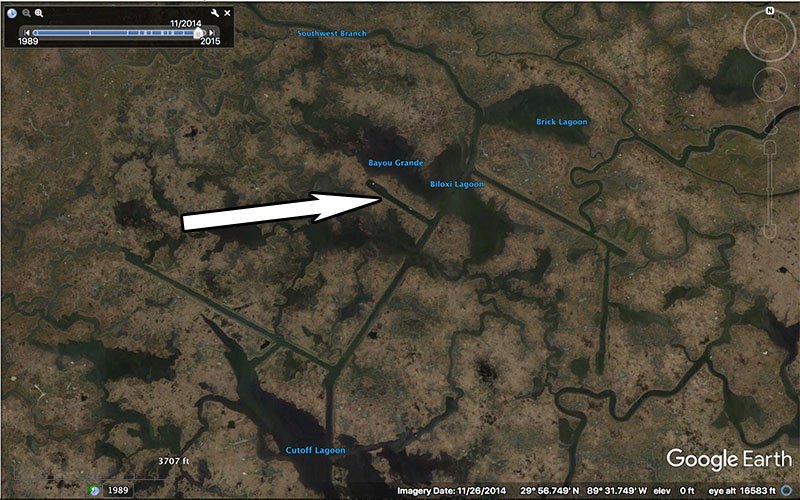
Interesting, isn't it? This train-of-thought would have me looking hard at the inside of flood gates, like the relatively "new" one in Bayou LaFourche which, coincidentally, is in the same area folks experience great bank fishing along LA-1.
How well has this theory of "still deep water" held up to catch winter speckled trout?
It's held up incredibly well. After the initial publication of this blog post in 2018, I set out to test this theory across Louisiana's coast each time it got really cold. The result? Great boxes of speckled trout!
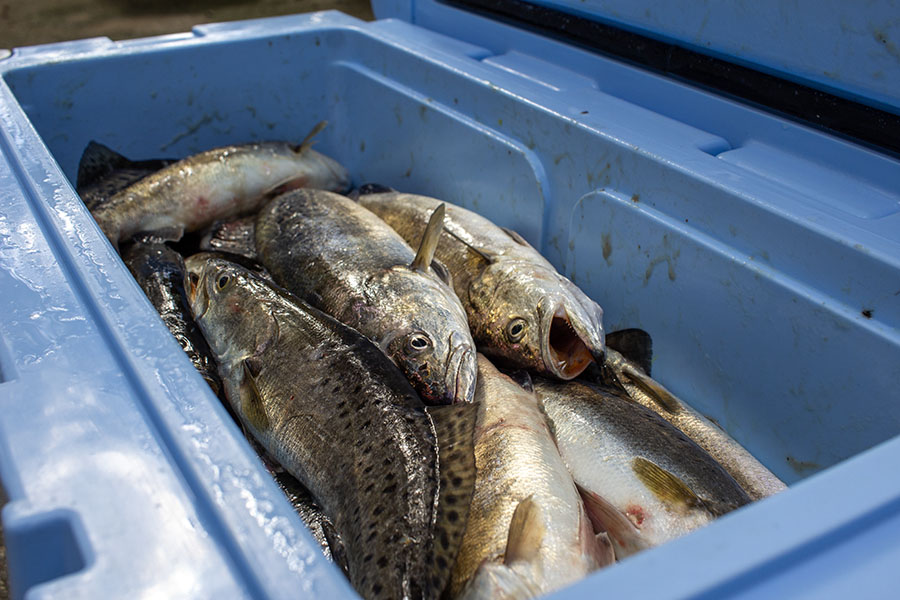
It seems to me what anglers deem as "bad" conditions actually set up to be a great opportunity to catch winter speckled trout and redfish. I've applied the same "still deep water" theory to catch 15+ redfish in Hopedale in this YouTube video. It can be as easy as looking at a map to discern where water is deep and not subject to current.
This simple, but oft overlooked, method is the bread and butter of what I teach inside Inshore Fishing 101. Imagine if you and I could sit down to discuss everything I know about inshore fishing. How should you safely navigate the marsh, gauge the predicted conditions and know where to cast a line? That and more is what you will learn inside Inshore Fishing 101 and the rest of my courses available only inside my membership, LAFB Elite.
“
Enlightening in so many ways
I love the ability to take the courses at my own pace, to be able to come back and revisit the info. That's because it's so much to try and digest for someone relatively new to inshore fishing.
The sections on fishing trip planning and execution inside Inshore Fishing 101 are priceless. They have given me so much insight into Captain Devin's thought process, and how to think about inshore fishing in order to find and catch fish.
“
I learned a lot, definitely not clueless like before!
Before taking Inshore Fishing 101, I literally knew nothing about fishing the marsh, much less saltwater.
I grew up fishing freshwater lakes in Maryland and then came to Tulane for college. It's been nearly 12 years since I dipped a rod in the water with an idea of what I was trying to do.
Devin's courses fixed all that. Now I have a plan, I know what to do and I have been getting results!
“
Thoroughly Enjoyed Inshore Fishing 101
I thoroughly enjoyed the Inshore Fishing 101 experience. The overall knowledge makes me feel more prepared to find fish on a consistent basis. I've been fishing in inshore Louisiana waters my entire life. While some of the knowledge was not new, the way it is presented with new material really seemed to tie everything together for me.
My biggest take away from 101 was the ability to pick (potentially) productive fishing spots. How to appropriately select weight and why was another huge help. I feel much more prepared for hitting the water!
“
Wish I Had This Ten Years Ago
Back when I first started fishing 10 years ago I was looking all over for someone teaching something like Captain Devin's Inshore Fishing 101, but there was no one.
I think of the many, many days that my buddy and I were out running around trying to find fish and didn't know what's taught inside 101.
We didn't have a chance.
We didn't understand the conditions, the necessary tackle, the seasonal conditions that required different techniques, etc. But that has all changed now that I've completed Inshore Fishing 101.
It's so much more fun to understand the bigger picture and use a process to find and catch fish! And yes! We catch a boatload more fish!

You’re welcome. Thank you for visiting my site and taking time to comment. I appreciate that.
My next homework assignment is to find some deep, slow or no flow areas! Great advice! I don’t get to Louisiana often to fish but put these lessons to use in Mississippi and Alabama. Great application in the gulf states! Thanks, Captain Devin!
You’re welcome, thanks for reading!
In regard to deep holes, a friend and I fished Geohagen Canal after a cold front and found specks and reds in 30+ holes. Had lite water current from bayous feeding the bay. Fished later on warm front and fish were in 4-5’ of water. Early cold fronts are fishable due to fish feeding up for winter.
Thanks for the tip. I will be sure to try it tomorrow.
Keith, I appreciate you because you’re enrolled in Inshore Fishing 101 and have always been the guy to raise his hand and ask questions when no one else does.
But I’m telling ya that you’re thinking into it too much! :)
We’re not converting to any other kind of fishing.
It’s the same thing it always has been: –> effectively fishing the entire water column <–
Boom, that's it.
How would you use your lure in these conditions without moving current? I was thinking you might have to convert to lake bass fishing tactics and sort of jig it vertically?
We did try Lakeshore and didn’t catch anything there, but did mark a bunch of fish at 10-12 feet deep. We positioned on them, but they didn’t bite. They coulda been inactive.
Hey George, thanks for commenting.
Are you sure those weren’t gar rolling on the surface? Could you see fish sitting on the bottom at all? (on your fishfinder)
Tried my luck at lakeshore estates today, but got skunked. I did see a couple of red fish jump which seemed very unusual given the freezing temperatures, so I definitely think your stillwater theory is accurate. They were there, just not wanting what I was offering.